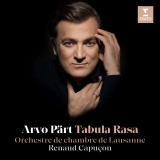Im Herbst 2021 wird Renaud Capuçon künstlerischer Leiter des Orchestre de Chambre de Lausanne. Sein erstes Album als Solist und Dirigent mit dem Ensemble ist ganz dem estnischen Komponisten Arvo Pärt gewidmet.
« Arvo Pärts Musik trägt uns aus der Dunkelheit zum Licht … Diese Musik ist nicht einfach nur entspannend – sie hat Tiefe und Dramatik. » Das ist also der Ansatz mit dem Capuçon an Pärts Tabula Rasa und an die anderen Stücke der CD herangeht. Und er greift. So wird der Satz Ludus in Tabula Rasa sehr dynamisch und Silentium bekommt durch Aufwertung der tiefen Streicher mehr Gewicht.
Fratres erklingt in der Fassung von 1992, mit Sologeige, Streichern und Schlagzeug. Im Vergleich mit anderen Interpreten (Kremer, Shaham, Meyers) zeichnet sich das Spiel von Capuçon durch eine große Intensität und viel feingliedrige Agilität aus. Insgesamt wirkt die Musik in dieser Interpretation weniger vergeistigt als in anderen Interpretation, dafür aber spannender.
Auch die übrigen Werker werden nicht primär meditativ und mystisch gespielt, sondern profitieren von einer unmittelbarer wirkenden Frische, die ich als wohltuend empfinde, weil die Expressivität trotzdem groß ist und jede Banalität vermieden wird.
In the fall of 2021, Renaud Capuçon will become artistic director of the Orchestre de Chambre de Lausanne. His first album as soloist and conductor with the ensemble is entirely dedicated to the Estonian composer Arvo Pärt. « This music is not just relaxing – it has a depth and drama. Its long lines take us from darkness to light. » That’s the approach Capuçon takes to Pärt’s Tabula Rasa and to the other pieces on the CD. And it works. Thus the movement Ludus in Tabula Rasa becomes very dynamic, and Silentium is given more weight with enhanced low strings.
Fratres is performed in the 1992 version, with solo violin, strings and percussion. Compared with other performers (Kremer, Shaham, Meyers), Capuçon’s playing is characterized by great intensity and much fine-limbed agility. Overall, the music seems less spiritualized in this interpretation than in others, but more exciting.
Similarly the interpretations of the other works are not primarily meditative and mystical, but benefit from a more immediate freshness, which I find pleasant, because the expressivity is nevertheless great and any banality is avoided.






















